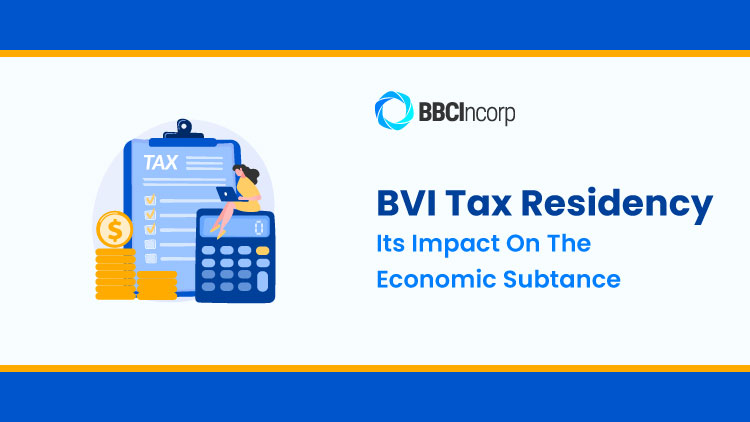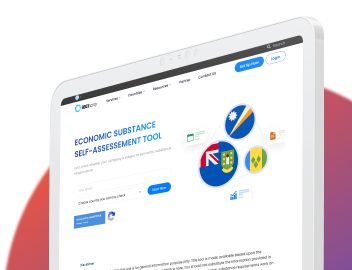
Table of Contents
The legislation aims to ensure that legal entities conducting specific relevant activities within the BVI are not merely shell companies, but have a substantial economic presence, activity, and management within the jurisdiction.
In this article, we will take a look at what BVI tax residency is, how it affects businesses, and explore its implication for BVI Economic Substance regulation.
Overview of BVI tax residency in the context of Economic Substance regulation
While the BVI does not have a formal definition for tax residency, it plays a crucial role in the context of the Economic Substance requirements. Not only does it determine the applicability and extent of Economic Substance requirements, but it also affects the compliance, exemptions, and reporting regime for companies and limited partnerships operating in the British Virgin Islands.
Is tax residency similar to resident status?
Tax residency and resident status are related but not necessarily the same thing.
Residency refers to the company’s legal status in BVI, based on factors such as business registration, property ownership, and other factors
Tax residency refers specifically to the company’s obligation to Economic Substance regulations. Tax residency status does not depend on your chosen business structure or type, it depends on various factors, including where your company is managed and controlled and the location of its business activities.
How does tax residency affect BVI company’s obligation to Economic Substance regulations?
A company’s tax residency status may have an effect on its compliance with the BVI Economic Substance (ES) requirements.
The BVI ES legislation requires in-scope legal entities that carry on relevant activities to meet certain economic substance tests. These tests require companies to have sufficient economic substance in the BVI in relation to their relevant activities, including maintaining a certain level of employees, premises, and expenditure in the BVI.
The purpose of these requirements is to ensure that companies are not using the BVI as a tax haven to avoid paying taxes in other jurisdictions.
If a BVI company is considered a ‘legal entity’ in the BVI, it is generally subject to the BVI ES requirements if it carries on any of the relevant activities. However, if the company is a ‘non-resident entity’ in the BVI, it may not be subject to the ES requirements. Therefore, companies need to understand their tax residency status and comply with economic substance requirements to avoid potential legal and financial consequences.
To find out the filing deadline for your Economic Substance reports, refer to our dedicated article.
Legal entity
Under the Economic Substance (Companies and Limited Partnerships) (Amendment) Act 2021, the BVI “legal entity” refers to:
- all registered BVI business companies and foreign companies; and
- all registered BVI limited partnerships and foreign limited partnerships (with or without a separate legal personality)
In-scope legal entities need to understand their obligations under the BVI economic substance requirements and take steps to ensure compliance. Failure to comply with the economic substance requirements may result in penalties or other legal and financial consequences.
Non-resident entity
A non-resident entity, on the other hand, is incorporated under the BVI Business Companies Act but does not fall within the scope of a ‘legal entity’ in BVI.
To be considered non-resident, a company must satisfy the two conditions below:
- it’s a tax resident of a country other than BVI, and
- that country is not included in the EU non-co-operative list.
The BVI ES legislation is complex and the applicability of the requirements can depend on various factors, including the type of business and business category. If you wish to know if your company falls under the scope of BVI’s economic substance regime, feel free to drop us a message via service@bbcincorp.com.
Economic Substance
See exactly what you need to do, by using this tool.

How can you comply with BVI Economic Substance?
To comply with the BVI Economic Substance requirements, in-scope legal entities that are tax residents in the BVI should take the following steps:
Step 1: Determine whether the entity is in-scope
You should confirm whether your entity engages in any of the relevant activities specified under the economic substance requirements.
Step 2: Conduct a substance analysis
Make sure you analyze your entity’s operations and activities to see if it has sufficient economic substance in the BVI, including whether it conducts core income-generating activities in the BVI, maintains a physical presence in the BVI, and has adequate levels of expenditure, physical assets, and personnel in the BVI.
Step 3: Establish an action plan
If your entity is found to lack sufficient economic substance in the BVI, establish an action plan to ensure compliance. This may involve taking steps to adjust the company’s operation or seeking professional consultants for practical advice.
Step 4: Maintain adequate records
You should keep adequate records to demonstrate that your entity complies with the economic substance requirements, including financial statements, employee records, and other relevant documentation.
Step 5: File an annual report
Submit an annual economic substance report to the BVI International Tax Authority, which will assess whether the entity has met the economic substance requirements.
Conclusion
In short, BVI tax residency status may affect your company to BVI Economic Substance requirements.
It’s important to seek advice from tax professionals to ensure that your BVI company complies with all relevant BVI laws and regulations. BBCincorp can provide you with more detailed information regarding BVI tax residency and its implications on BVI companies, so feel free to contact us for further assistance.
Disclaimer: While BBCIncorp strives to make the information on this website as timely and accurate as possible, the information itself is for reference purposes only. You should not substitute the information provided in this article for competent legal advice. Feel free to contact BBCIncorp’s customer services for advice on your specific cases.
Industry News & Insights
Get helpful tips and info from our newsletter!
Stay in the know and be empowered with our strategic how-tos, resources, and guidelines.





